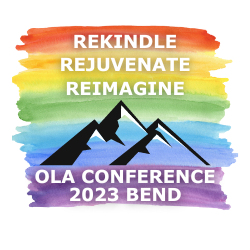OLA 2023 Conference Conduct Guidelines, Agreements, and Resources
The following is the OLA guideline for conduct during the 2023 conference. To view the complete policy, OLA’s Statement of Appropriate Conduct at OLA Conference, visit: https://ola.memberclicks.net/conferences
GUIDELINE
Oregon Library Association is strongly committed to diversity, equity, and the free expression of ideas, as expressed in the American Library Association’s Statement of Appropriate Conduct at ALA Conferences. The values and beliefs delineated within ALA policy describe conduct based on a firm belief in the value of civil discourse and the free exploration of competing ideas and concepts – with a fundamental respect for the rights, dignity, and value of all persons. As a chapter of the ALA, OLA fully supports these values.
Building an inclusive organizational culture is challenging in normal times, but in the age of COVID-19 creating inclusive virtual spaces can seem especially daunting. It is imperative to our collective success that each person is able to be fully present and contribute their authentic selves in every meeting.
Note: For the 2023 Conference, please report feedback to improve the OLA conduct guidelines and agreements and/or incidents of personal, cultural, or professional harm during the conference directly to OLA President Kate Lasky at olapresident@olaweb.org.
COMMUNITY AGREEMENTS TO BUILD AN INCLUSIVE CULTURE
Confidentiality & Permission — We agree to not share each other’s stories or narratives without permission.
Fully Present and Patient — We agree to listen to each other without distraction and without predatory listening.
Default to Inquiry over Judgement — We agree to be curious and ask questions before making judgements.
Share the Air — We agree to share our perspective, ideas, and narratives while allowing space for others to share their perspective, ideas, and narratives.
Believe People’s Narratives — We agree to believe each other’s perspective, ideas, and narratives.
Acknowledge the Difference Between Intent and Impact — We agree to reflect on how our intent and impact may differ or align.
Repair Work — When our intent and impact do not align, we agree to acknowledge harm, make a commitment to improve, and ask what is needed to move forward. The ask in this community agreement is that we each do the work to acknowledge that our intent and the impact of our actions are two different things, and to take responsibility for any negative impact we have. (This can be as simple as apologizing.) (AORTA, 2021).
Self-Compassion — When our intent and impact do not align, we agree to be compassionate with ourselves, understanding we are all lifelong learners. We can’t be articulate all the time. Often people feel hesitant to participate in a workshop or meeting for fear of “messing up” or stumbling over their words. We want everyone to feel comfortable participating, even if you don’t feel you have the perfect words to express your thoughts (AORTA, 2021).
*Adapted from Oregon Department of Human Services (ODHS), Guide for facilitating inclusive virtual meetings, https://www.oregon.gov/DHS/CHILDREN/Documents/FacilitatingInclusiveVirtualMeetings.pdfand *Anti-Oppression Resource and Training Alliance (AORTA): https://aorta.coop/portfolio_page/anti-oppressive-facilitation
ADDITIONAL RESOURCES
OLA EDI Antiracism Committee: https://ola.memberclicks.net/ola-edi-antiracism-committee-about-usNational Center for Cultural Competence, Georgetown University: https://nccc.georgetown.edu/Cultural Intelligence Center: https://culturalq.com/
